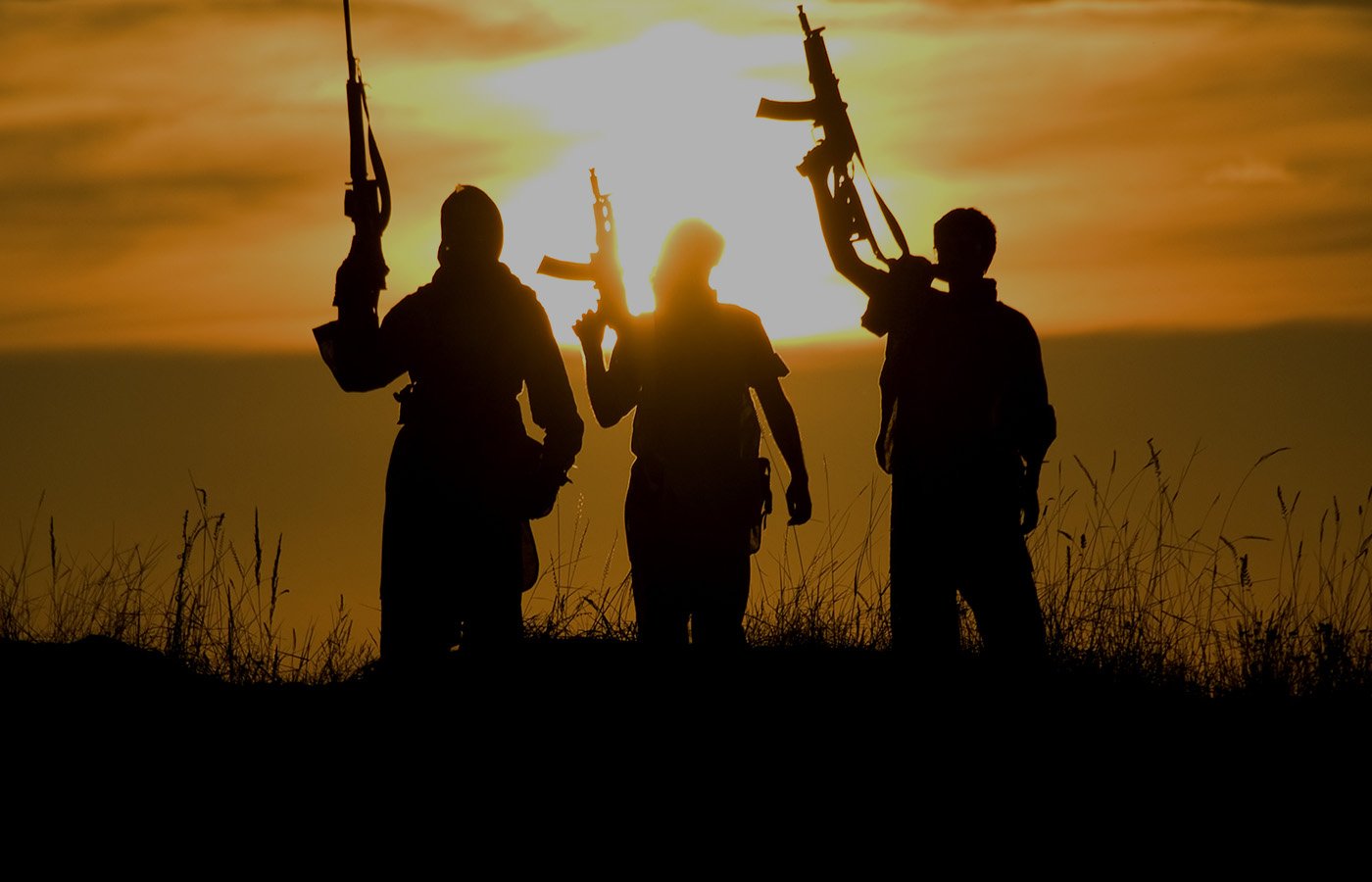By
Emmanuel Gandu
HIGHLIGHTS
* Excerpts
* Evolution of terrorism globally
– Italian Red Brigades
– Northern Ireland war
– Basque Conflict
– Israeli-Paletinian conflicts
– Al Qaeda/Osama bin Laden
– September 11
– etc, etc.
* The role of the United Nations
* Top 10 world’s most terrorised countries (2025)
* Top 10 world’s terrorist groups (2025)
* Terrorism and Nigeria
* Effects of terrorism on Nigeria
EXCERPTS
“Security threats and challenges not only affect human life, undermine national stability and rule of law but also have adverse influence on the economy affecting price, output, trade balance, employment, poverty, inequality, production, manufacturing, investment, defense expenditure, government budget patterns, socio-political environment, and several others.”
EVOLUTION OF TERRORISM GLOBALLY
According to the United Nations, terrorism is defined as the planned and calculated use of violence to create a general climate of fear in a population of non combatants and thereby to bring about a particular political and ideological objective.
Terrorism has been practiced by :
1. Political organisations with both rightist and leftist objectives.
2. Nationalistic, regional, and tribal groups.
3. Religious groups.
4. Revolutionaries.
5. State institutions such as armies, intelligence services, and police.
The terms “terrorist” and “terrorism” originated during the French Revolution of the late 18th century. But became widely used internationally and gained worldwide attention in the 1970’s.
The Red Brigades, an Italian militant left-wing organization founded in October 1970 and specialized in kidnapping, murders, bombing, and sabotage aimed at undermining the Italian state and pave the way for a Marxist upheaval. Others were during the “troubles” of the 30 years war in Northern Ireland, the Basque Conflict, and the Israeli-Palestenian conflict.
As tensions began to assume in other parts of the world, the increased use of suicide attacks from the 1980’s onwards was typified by the “September 11 attacks” in the United States in 2001 which was organised and led by the Al – Qaeda mastermind Osama Bin Laden. As a result of rising terrorist groups and terrorism incidents across the world, the Global Terrorism Database of the UN recorded more than 61,000 incidents of non-state terrorism, resulting in at least 140,000 deaths between 2000 and 2014.
The United Nations Global Counter – Terrorism Strategies have aimed at defining the role of the office for Disarmament Affairs through the resolutions adopted by the General Assembly in order to address the threats of terrorists.
Such General Assembly Resolutions include :
1. A/RES/60/288
2. A/RES/62/272
3. A/RES/64/297
Resolution 60/288 of 2006, for example, states that terrorism “constitutes one of the most serious threats to international peace and security.”
By the year 2020, the activities of the ever increasing terrorist groups became more violent with catastrophic consequences to human life.
The Global Terrorism Index (GTI), a UN study mechanism tool is responsible for comprehensive study analysis of the impact of terrorism across the countries of the world covering 99.7 percent of the world’s population, bringing out facts and data. Consequently, the Global Terrorism Index for 2020 released the list of the 10 most terrorised countries in the world. This list is from the most terrorised country at No.1 down to the least at No.10 in the following order :
1. Afghanistan
2. Iraq
3. Nigeria
4. Syria
5. Pakistan
6. Somalia
7. India
8. Yemen
9. Philippine
10. DR Congo
WORLD’S TOP 10 MOST DREADED TERRORIST GROUPS (2025)
(1) Al – Qaeda: Global network aiming to expel Western influence from Muslim lands and establish a Caliphate.
(2) Islamic State (ISIS/ISIL): Declared a Caliphate in 2014, seeks global Islamic dominance through violent Jihad.
(3) Taliban: Enforces strict Islamic law, governs Afghanistan since 2021.
(4) Boko Haram: A Nigerian group aiming to establish an Islamic state, known for rejecting Western Education in preference for Islamic Education.
(5) Al – Shabaab: Seeking to overthrow governments and impose Sharia especially in East Africa.
(6) Hamas: Palestinian group targeting Israel to establish an Islamic state, known for the October 7, 2023 attack on Israelis.
(7) Hezbollah: Lebanese group resisting Israel and seeking Islamic governance, operates regionally and globally.
(8) Lashkar – e – Taiba: Focuses on liberating Kashmir from India, executed the 2008 Mumbai attack.
(9) Jaish – e – Mohammed: Targeting India over Kashmir, linked to the 2019 Pulwama attack.
(10) Jamaat Nusrat Al-Islam wal Muslimeen (JNIM): Aiming to enforce Sharia in the Sahel and West Africa.
EFFECT OF TERRORISM ON NIGERIA
(1) Insecurity
As a nation, Nigeria has long been regarded as Africa’s powerhouse. This is undoubtedly due to her big economy, abundant natural resources, population, stability, and the ingenuity of the “can-do-spirit of the Nigerian. Added to these is the size of the Nigerian military as well as her participation in successive military interventions in the world, Africa, and the West African sub-region.
However, terrorism poses a significantly dangerous security threat to Nigeria’s stability and development. The country now grapples with several security challenges that directly impacts the economy, education, industry, manufacturing, agriculture, social life, tourism, and major aspects of growth and development.
Consequently, the recorded unprecedented security challenges such as those from terrorist groups like the :
– Maitatsine uprising of the early 1980’s.
– Boko Haram founded by Mohammed Yusuf in 2002.
– Lakurawa of which Nigeria had known its existence since 2016/2017, and by 2023 became a greater problem to handle.
– Fulani herdsmen of which some politicians are alleged to have imported from neighbouring countries for the purposes of prosecuting the 2015 general elections that removed Goodluck Jonathan.
– Others include banditry and kidnapping for ransom.
Lamentably, Nigeria is no doubt confronted with a myriad of security challenges to a magnitude never envisaged. Findings revealed that these security threats and challenges not only undermines national security and rule of law but also have adverse effect on the economy, output, affecting commodity price, trade balance, employment, poverty, inequality, defense expenditure, government budget patterns, socio-political environment, and several others.
Despite the series of efforts by successive administrations to stem the tide of terrorism especially on increased allocation of security funds to the Ministry of Defence, it had been a herculean task coping with the menace.
A whopping sum of #6.57 trillion was allocated in the 2025 Security and Defence Budget, the highest ever in the history of Nigeria. These yearly increases in the budgetary allocation were deliberately intended to eliminate the rising cases of insecurity in Nigeria experienced particularly from 2015 to 2025.
However, across the North East, Benue and Plateau states, Southern Kaduna, Zamfara and Niger states, entire towns, villages and communities have been taken over by terrorists as they continue to wreck Northern Nigeria with impunity.
Sadly, by 2025 security budgets of the 19 Northern states where terrorism indicates a poor attitude to investment in security matters. A situation where Lagos state which has little to worry about terrorism budgets far more funds to security than any of the 3 geo political zones of the North leaves much to be desired:
* North Central – #95 billion
* North West – #65 billion
* North East – #55 billion
* Lagos state – #124 billion
(2) Food inflation
Given Nigeria’s predominant reliance on agriculture, the menace of Boko Haram, Lahurawa, Fulani herdsmen, bandits etc has continued to disrupt agricultural activities as farmers are unable to access their farms. This disruption has led to a drastic decline in food production, threatening food security and exacerbating food crisis. Nigeria, therefore is undergoing acute food scarcity and hunger. From 2022, according to the Consumer Price Index (CPI) report by the National Bureau of Statistics (NBS), food prices began to experience increases.
The food inflation rate from 2022 is reflecting the following increases :
1. June 2023 = 25.25%
2. August 2023 = 29.89%
3. February 2024 = 37.92%
4. June 2024 40.87%
Furthermore, figures from NBS reveals that cost of food in Nigeria increased by 21.26% in April 2025 over the same month in the previous year of 2024, thereby reaching an all time high from 1996. According to the ‘Cadre Harmonise’ food security report of March 2025, nearly 31 million Nigerians across 26 states are expected to face acute hunger and food insecurity by June – August 2025
(3) Investment flight from Nigeria
As a result of insecurity due to terrorism, many businesses and companies have shut down, relocated to neighbouring countries with their investment. The economic displacement of the population creates a ripple effect on local markets, businesses and the overall economy.
Besides, foreign direct investment is absent, interstate travels and transportation of goods and services across borders is not feasible. The resultant loss of income and economic opportunities further compounds the challenges for the people.
(4) Collapse of Education
(5) Incteasing no. of out-of-school children
Peace 🙏
26/7/2025



























